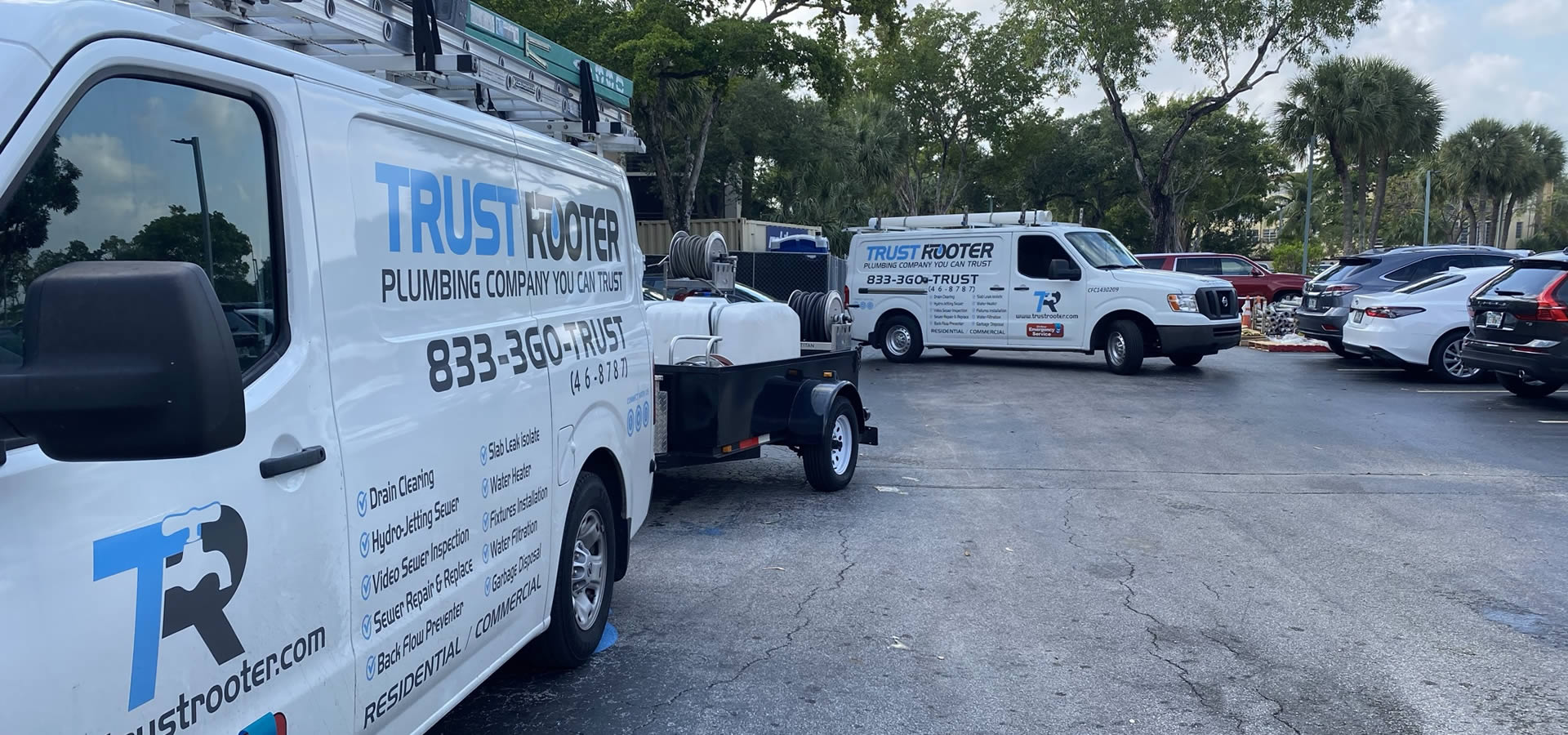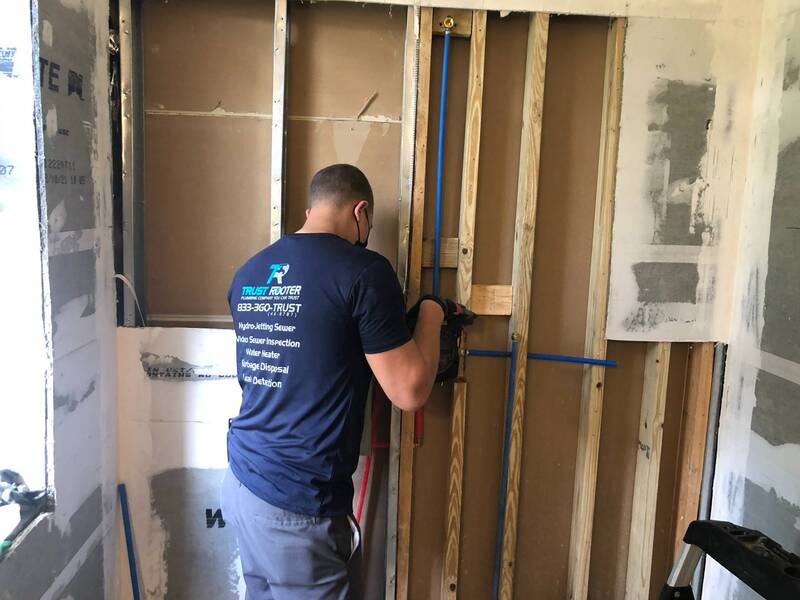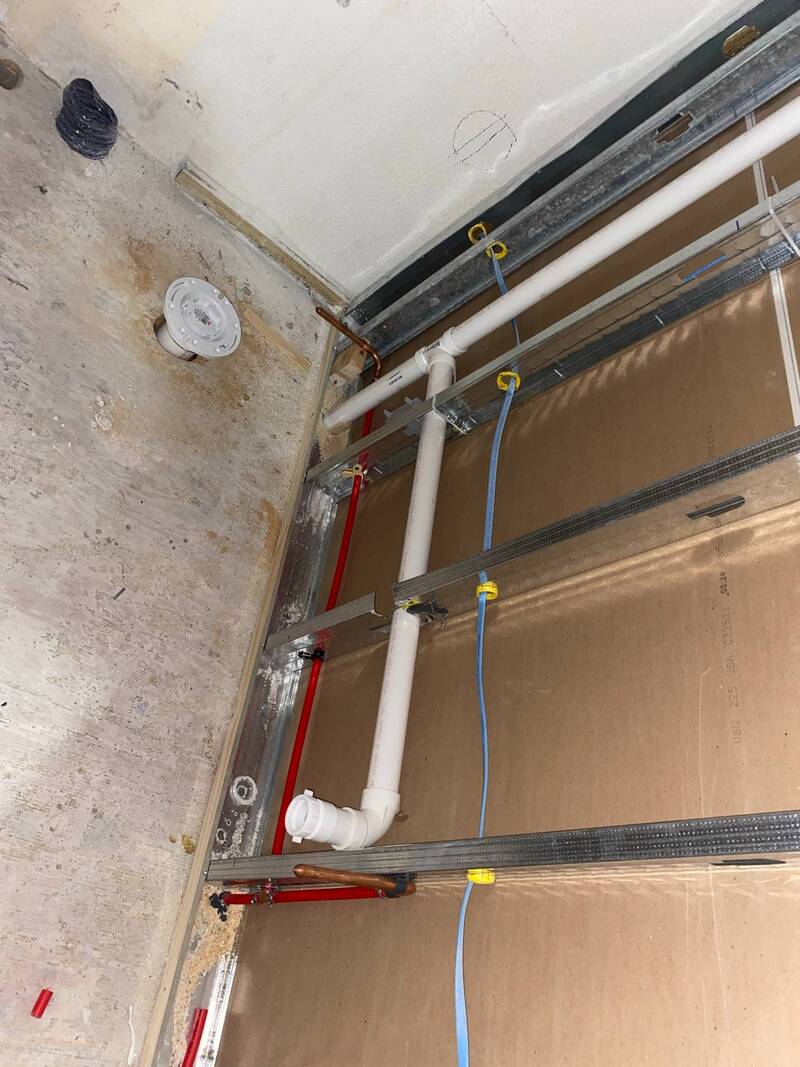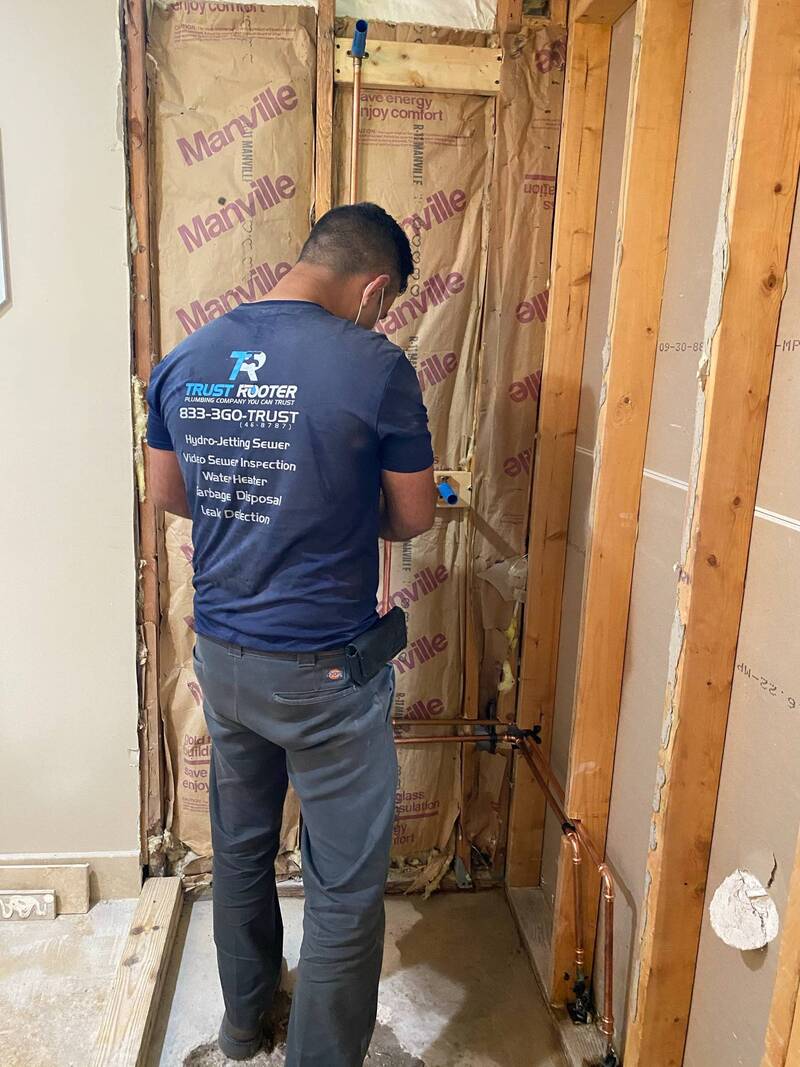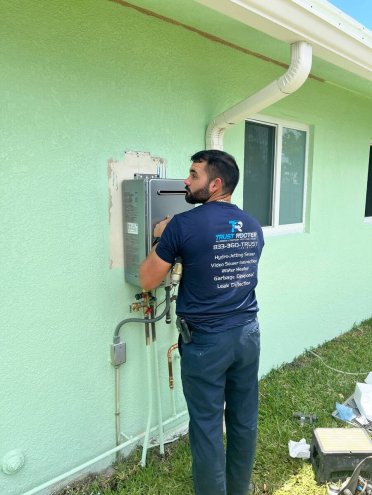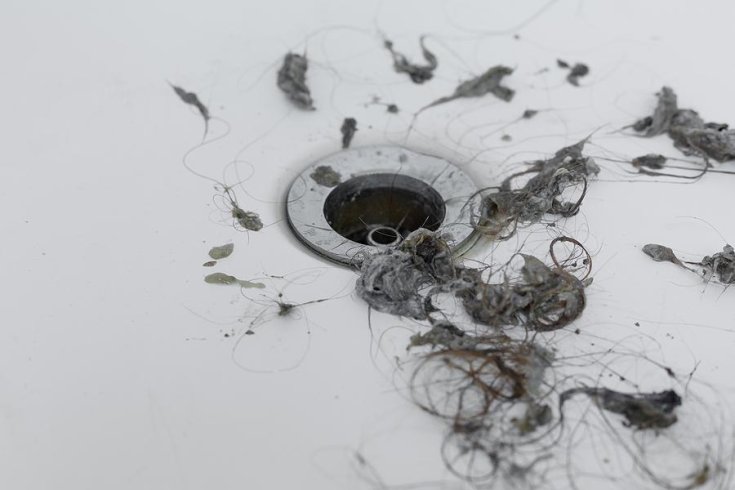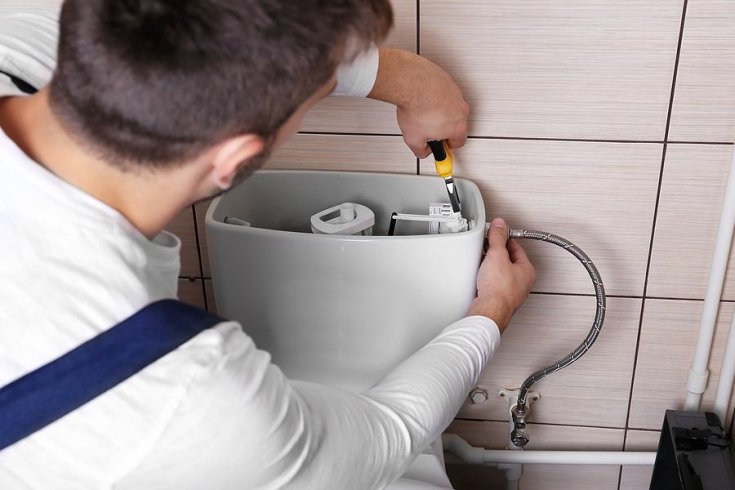10% Discount New Customer
Whole House Repiping
Do you need a whole house repiping?
If you need house repiping in Broward or Palm Beach counties, you are in the right place. Solving your plumbing issues requires the visit of a local plumber who detects and clears blockages, as well as seal cracks, etc. After some time, repairing leaks is no longer the right option for you. As your plumbing system ages, repairs or the replacement of some parts would not just cut it anymore. You will rather need to embark on a whole-house repiping.
If you find yourself in such a situation, reach out to TRUST ROOTER via (833) 346-8787. The task of repiping might be rigorous, but it is one that should be done only if there is a need for it. If you are not sure your house needs a repiping, now is the time to consult with an expert on the matter.
Meanwhile, we have created a guide to the entire process, as seen below:
A house repiping is need if:
Down till the 60s, galvanized steel was used by plumbers for installing pipes. Although these pipes are long-lasting, they have 40-50 years lifespan. If you still have such pipes in your plumbing system, you are long overdue for house repiping. Plumbers mainly use plastics and coppers today, and these last longer and do not experience corrosion and rust as zinc materials do.
Just as with other systems in your household, you will have to eventually replace your pipes. A plumbing professional can help in determining if the house repiping suits you best.
A new plumbing system may need to be installed if your home still has old and hazardous piping materials such as:
- Polybutylene: these can easily break as they are extremely fragile. They were extensively used between the 70s and 90s.
- Galvanized Steel: These materials are safe. Still, they can result in low water pressure from corrosion or rust.
- Lead: Lead is a toxic metal that poses serious health risks when they seep into water
When you experience frequent leakages
A replacement or repair might be required when you experience a few leaks from time to time. Still, if you observe that your piping system is so vulnerable to leaks, then you have to consider a whole-house repiping. Many leakages indicate a failure in your plumbing system. Repairing leakages repeatedly will prove to be costlier in the long run, and you are not guaranteed a total fix. So, why not consider repiping your house.
Water discoloration
A number of reasons can be given as to why your water is discolored, and you may be surprised that a faulty pipe might be included. If the delivery pipe corrodes, contaminants will be introduced into the water, resulting in discoloration. However, it is noteworthy that your health does not stand immediate risks from exposure to such contaminants, but you have to make sure that your water quality is of the highest standards. This will safeguard your health in the long term. To identify the source of your water
How whole-house re piping work?
Although whole-house repiping is a huge task, it can take just a few days to be completed. When you employ the services of a reliable plumbing contractor, your work will be expertly managed without comprising quality for speed. At the completion of the work, you will observe a stark improvement in the operation of your plumbing system such as reduced leakages, clogs and utility bills.
TRUST ROOTER delivers whole-house piping and repiping services. As we fully understand the feeling of hesitation to embark on such projects, we will only do the job when it is ascertained to be the best choice for you.
What you should know about repiping
A repipe refers to the installation of new cold and hot water pipes in your home for the replacement of existing galvanized or copper pipes. This is done for water moving into the building only.
Why repipes are done instead of fixing leakages
History has it that more leakages will be experienced in subsequent months after a galvanized or copper pipe begins failing and leaking. Detecting every leakage will prove to be expensive, even more expensive than repiping and has greater chance of causing more damage to your facilities. A repipe efficiently solves your piping issues.
Are repipes costly?
No. Our crew here at TRUST ROOTER are specialists in repiping homes. They are trained to carry out the job within 2 – 5 days. As we specialize in piping, our pricing is exact, fair, and reasonable. An estimate will be given in your home and every step of the process will be explained.
Do we have to relocate during a repipe?
You only have to relocate if you choose to. This is a construction process involving a lot of activities. It is worth noting that activities will not take place in every room at the same time, so you can choose to stay back, do some errands or go out on visiting. We can assure you of available water in one of your bathrooms after the first day for overnight use.
What is the duration of a repiping process?
A typical repipe is separated into three parts. Depending on the size of your home, a typical repiping takes 2-5 days. After we receive a permit from the city, the second part involves the inspection from the city and the final part involves patching all holes made during the piping installation. More details will be provided by our estimators.
What plumbing materials can I use?
Our repiping experts at TRUST ROOTER make use of only US-made, Uponor’s PEX-a plastics, and Type L copper. These materials are highly dependable and will ensure that no further piping job is carried out in your home. These materials yield excellent results. The decision on what to use depends on the choice of the homeowner. We provide a warranty for both products. More details will be provided by our estimator.
Are your services warranty based?
Yes, we do provide warranties for our services and they are the best you can find around. We offer a 2-year warranty on all our services. In addition, we are fully insured, licensed, and bonded.
My water will be turned off for how long?
In general, the water is turned off by 9 am on the first day and is back on at the day’s end. Most times, you will fully gain access to the water after the day’s work. If the process exceeds one day, your household will gain access to one bathroom to take you through the night.
What causes slab leakages and pinholes?
A peek on popular search engines like Google will give you numerous reasons why this occurs. Some of the answers ascribe slack leakages to be the result of chemicals present in water, while other responses reveal the interaction between soil and the pipe as the cause. Regardless of the reasons, the fact remains that a number of homes in SoCal with copper plumbing systems begin to fail after some 10-15 years. Existing pipes made of copper do not last as long as they used to.
What is PEX?
PEX is an acronym, which refers to cross-linked polyethylene. There are a number of PEX brands available in the market. This plastic tubing, which is designed to contain potable water has widely been used in the US for many years.
Which is better, PEX or Copper?
The choice depends on the preference of the homeowner. The background of the person will go a long way in influencing what system is decided upon. Still, some homeowners prefer PEX for its more reasonable pricing and inhibition of water sounds flowing through it. Both systems are great solutions to slab leakages and pinholes.
Are the drain pipes from the showers and toilet included in standard repiping?
No, they are not. They are both distinct and separate systems. The repiping offered by most companies only cover the cold and hot water systems in the house. Waste or drain systems are handled separately. Our team can handle both for you. You have to notify our estimator during the FREE estimate process to help you with the best options available.
Will the wallpapers around the house get damaged, as they are quite expensive?
No, they would not. Regardless of the attic space or crawling areas available in most buildings, there are alternative routes to run new pipes across your home. As professionals, we will avoid off-limits areas. Still, alternative routes may require the use of more materials and may be labor-intensive. An honest assessment will be given of what is attainable or not during the estimate.
Is it okay for members of my household with allergies to remain in the building during repiping?
When the job commences, dust will be created as walls are opened. Your belonging will be adequately cared for, but it will be best for the family member with allergies to hang out with a friend or relative for a while.
Why is a slab home repipe more expensive than a raised foundation home?
A home with a raised foundation provides access to our expert plumbers, making it easier to run pipes without breaking many holes open. Whereas a slab foundation requires the opening of more holes to get pipes across the building. More labor and patching is required in such buildings.
Can a pipe be rerouted to my kitchen to save cost?
We have observed that most leaks usually begin from hot water lines from the kitchen. This is because the sink of the kitchen is usually in use, the hot water line gets to wear off quickly as water flows through it. Depending on your home, we can bypass the slab’s hot water line and send a new line through the attic or the ceiling. Even though this can be done, experience has shown that the first leakage is a result of failure in the piping system. Hence, a single line replacement will not prevent further leakages from taking placing in adjacent lines. Bypasses or re-routing are good emergency procedures, but they are not long term solutions. A whole-house repipe is more viable and cheaper in the long term.
Can you fix the slab leakage instead?
Yes, but you have to consider some facts. To access the slab leakage, a jackhammer is needed to go through the foundation. This means that the tiles or wooden flooring will have to be removed or broken. This is quite expensive, especially when you consider that only one leakage is set to be fixed. In addition, history reveals that a leakage from a pipe will lead to further leakages eventually. This procedure is not cost-effective. Hence, a whole-house repiping is the economical choice.
Must we replace the faucet handles of the showers as we like what we have?
No. Replacing the faucets is not necessary. But here is why we do recommend the replacement of old faucets:
- New facets meet up with recent plumbing codes
- Much stress is put on older faucets while detaching copper or galvanized pipes from them.
To keep them operating in optimal conditions for a number of years to come, we encourage you to get new ones installed with new pipes. To find out more about keeping antique handles, do consult our estimator when he visits your home.
How can I detect a slab leakage?
You can look out for several signs. They include:
- warm or hot floor surfaces around the house
- The water meter dial spins continually, even after switching off all the appliances around the house
- continuous running of the water heater
- These signs lead up to higher water and gas bills at faster rates than before.
What is the piping size used during a whole-house repiping?
The size of the pipe will largely depend on your house size and the number of showers, toilets, sinks and other fixtures in it. On the average, the sizes of pipes used for repiping include a one-inch, ½ and ¾ inch piping, which are to be installed based on the plumbing codes of Florida.
